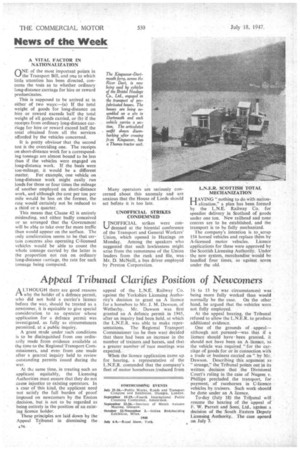Appeal Tribunal Clarifies Position of Newcomers A LTHOUGH there are
Page 28

If you've noticed an error in this article please click here to report it so we can fix it.
good reasons I—I why the holder of a defence permit, who did not hold a carrier's licence before the war, should be treated as a newcomer, it is equitable to give special consideration to an operator whose application for a defence permit was investigated, as fully as circumstances permitted at a public inquiry.
A grant made under such conditions is to be distinguished from one ordinarily made from evidence available at the time to the Regional-Transport Commissioners, and even from one made after a general inquiry held to review outstanding permits issued during the war.
At th.: same time, in treating such an applicant equitably, the Licensing Authorities must ensure that they do not cause injustice to existing operators. In a case of this kind, the applicant need not satisfy the full burden of proof imposed on newcomers by the Enstort decision, but is not to be regarded as being entirely in the position of an existing licence holder.
These principles are laid down by the Appeal Tribunal in dismissing the s76
appeal of the L.N.E. Railway Co. against the Yorkshire Licensing Authority's decision to grant an A licence for a horsebox to Mr. J. M. Dawson, of Wetherby. Mr. Dawson was first granted an A defence permit in 1945, after an inquiry had been held, at which the L.N.E.R. was able to make representations. The Regional Transport Commissioner (as he then was) decided that there had been an increase in the number of trainersand horses, and that a greater number of race meetings was expected.
When the licence application came up for hearing, a representative of the L.N.E.R. contended that the company's fleet of motor horseboxes (reduced from 16 to 13 by war circumstances) was being more fully worked than would normally be the case. On the other hand, he argued that the vehicles were not fully employed.
At the appeal hearing. the Tribunal refused to allow the L.N.E.R. to produce additional evidence.
One of the grounds of appeal— although not pursued—was that if a licence should have -been granted, it should not have been an A licence, as the vehicle was required "for the carriage of goods for or in connection with a trade or business carried on by Mr. Dawson. Describing this argument as "strange," the Tribunal points out in its written decision that the Divisional Court's ruling in the case of Nugent v. Phillips precluded the transport, for payment, of racehorses in C-licence vehicles by trainers. Such work-should be done under an A licence.
To-day (July 1B) the Tribunal will resume the hearing of the appeal of F. W. Parratt and Sons, Ltd., against a decision of the South Eastern Deputy Licensing Authority. The case opened on July 7.




















































































